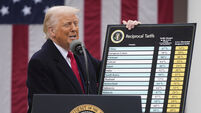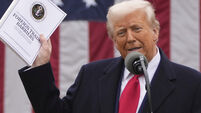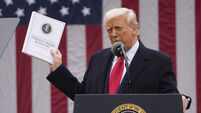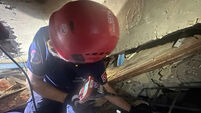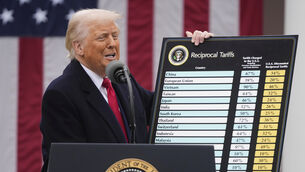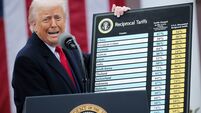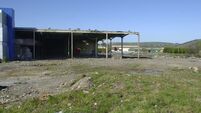LIVE: Simon Harris calls for negotiation as Donald Trump lashes 20% tariffs on EU imports

US president Donald Trump has lashed 20% tariffs on all imports from the EU as part of a raft of measures which will hit Irish exports.
Among the measures announced were:
- A 20% tariff on all goods that come into the US from the EU. Pharmaceuticals will not be included in this for now.
- Other country-specific tariffs, including 34% on China; 46% on Vietnam; 10% on Britain; and 31% on Switzerland that will come into force on April 9.
- A 25% tariff on imported cars and vehicles, which came into force at midnight.
Speaking in the Dáil, finance minister Paschal Donohoe said that the “global response” to Mr Trump’s tariffs was not yet clear.
“What we will do now is begin modelling what we know,” Mr Donohoe said, saying that these details will be published in the weeks ahead.
He said there are several assumptions within the ESRI’s analysis, published in recent weeks, that will now be tested, including what will happen with investment levels by foreign companies.
“I’ve been making the point that at the basis of what we know at the moment, we are moving into a scenario of lower growth and lower employment growth,” Mr Donohoe said.
“But I’ve been equally clear there are other scenarios that could effect that, which is why in the time ahead what is critical is we look at how we can negotiate with the US to see if we can avoid the darker and more damaging scenarios coming to pass.”
Responding to Mr Donohoe, Sinn Féin’s finance spokesperson Pearse Doherty said that it was key that things are de-escalated with the US.
“What happened yesterday, in my view, was an act of economic sabotage by the US administration in relation to their own economy,” Mr Doherty added.
Reacting to the tariff announcement, Cork Chamber CEO Conor Healy urged the Government to prioritise measures protecting jobs and mitigating the impact of punitive trade policies.
"The level of exposure will vary across sectors and businesses, from large multinationals to SMEs. Measures to mitigate the impact and safeguard jobs must be prioritised. In the short term, continued support for SMEs is essential," said Mr Healy.
“Additionally, support measures for impacted sectors will be crucial in helping the most vulnerable businesses manage cash flow, restructure operations and maintain employment while developing alternative markets.”
Some political reaction coming in now, with Tánaiste Simon Harris calling for the United States to get around the negotiating table after announcing their slate of tariffs.
“Tariffs are a bad idea. They’re bad for the Irish economy, they’re bad for the European economy and they’re bad for the United States because what they do is they push up prices. They make things more expensive and they certainly don’t help consumers with the cost of living,” Mr Harris said.
“I think though now that the United States has had its big bag moment and made this announcement, now it’s time to get around the table and try and find a negotiated way forward.”
The Tánaiste said that the European Union will “have to respond” if a negotiated settlement cannot be reached.
Pressed if he expects the pharmaceutical sector to be included in future rounds of tariffs, Mr Harris said that the Government needs to take Mr Trump at his word.
“My working assumption has to be that there will be further measures directed at pharma or at least that’s the intention of the US administration,” he said, citing Mr Trump’s move to introduce sectoral tariffs on steel, aluminum and the automotive industry.
Mr Harris said that the Government understands that pharmaceuticals are currently excluded from Mr Trump’s tariffs, but that this could change in a separate round of tariffs.
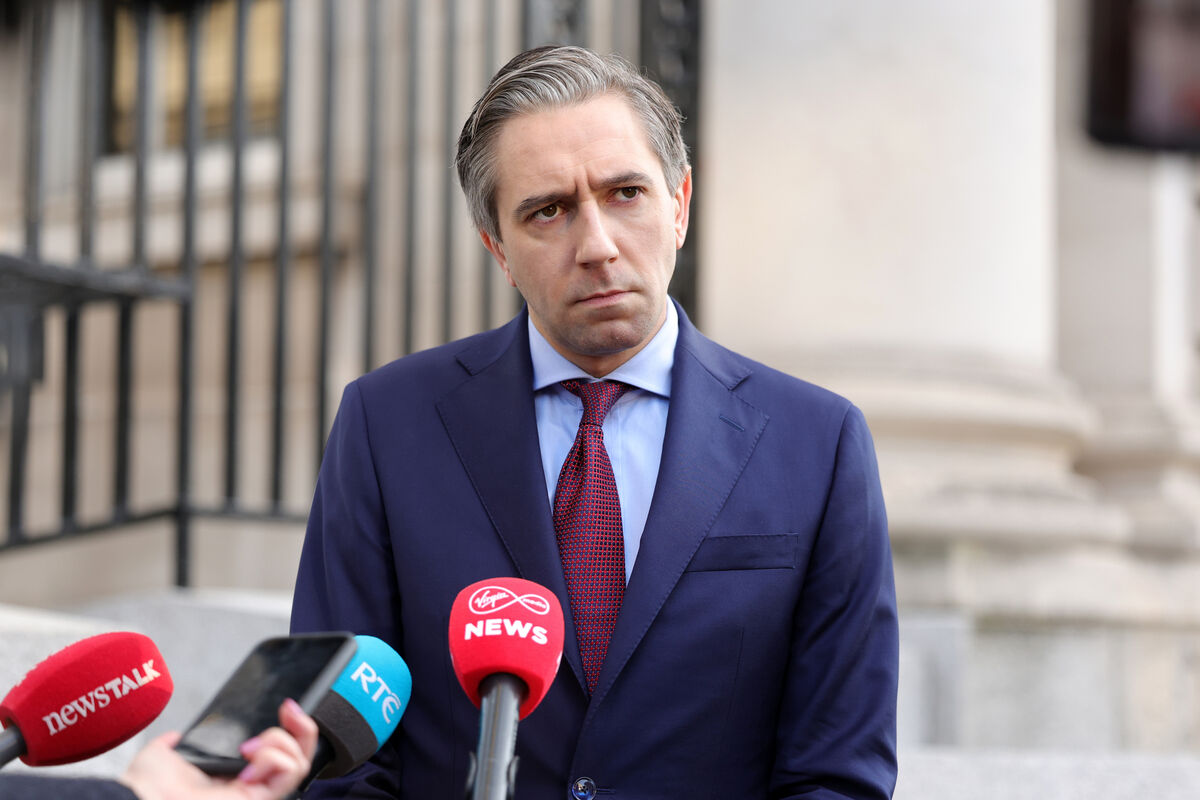
Elsewhere, speaking on RTÉ’s , enterprise minister Peter Burke warned that there would be “primary and secondary consequences” of Mr Trump’s tariffs, saying there will be a “significant amount” of Chinese goods redirected to other markets.
“The EU needs to have a very clear and concise approach to that. We need to ensure that we avoid dumping in our marketplace,” he said.
Mr Burke questioned Mr Trump’s methodology of calculating how much the EU charges the US for its imports. The US president said yesterday that the EU charges the US 39% in import tariffs.
“One of the things that jumps off the page at me is when Donald Trump, the President, refers to 39% from a European context, and 10% from a UK context,” Mr Burke said.
“I would have to have a look at where is he getting the 39% from? Obviously, is he looking at Vat? Is he looking at digital regulation?
“But when I look at the UK, they also have Vat as a tax.” The enterprise minister sought to allay fears of businesses, saying that they must remain calm.
“We will have a measured approach to this,” Mr Burke said, saying that Ireland is approaching the issue from a position of strength.
Mr Burke said the Government would be hosting a meeting of its trade council on Friday, where ministers would hear from various sectors to see “where the vulnerabilities lie”.
Danny McCoy of Ibec has warned that Trump’s tariffs could have implications for the Windsor Framework.
Speaking on RTÉ radio, he said the UK have been hit with a 10% tariff compared to the 20% tariff by the EU.
"This has implications for the Windsor Framework and for the no border on the island of Ireland,” he told . “I think this is a very serious issue. And it's not just what Trump has done, it's how we retaliate back. If the UK do nothing and the EU comes with a 20% tariff, that'll make it even more complicated.”
When asked what he wanted the government to do in response to the tariffs, Mr McCoy said: “We've been here before with covid and with Brexit and so some of the measures that we know is State supports are going to be required for those whose demand will go down quite dramatically as a result of these price movements."
In the business world, stocks dived on Thursday morning as investors scrambled for the safety of bonds, gold and the yen.
The dollar was swept to a six-month low, falling along with US bond yields after Mr Trump imposed tariffs that raise effective import taxes to the highest levels in a century.
Nasdaq futures dropped 3.2%, while European futures were down nearly 2%. Meanwhile, Tokyo's Nikkei fell by 3%, reflecting eight-month lows, which led heavy losses across Asia.
Apple's market capitalisation fell by more than $240bn (€219bn) as its shares slid by 7% in after-hours trade, while Nvidia's market cap dropped by 5.6%.
How have other countries reacted to the tariffs?
China’s commerce ministry said Beijing would “resolutely take countermeasures to safeguard its own rights and interests”, without saying exactly what it might do.
Australian Prime Minister Anthony Albanese said the US tariffs imposed on his country were totally unwarranted, but Australia will not retaliate. The US and Australia have a free trade agreement.
“President Trump referred to reciprocal tariffs. A reciprocal tariff would be zero, not 10%,” said Mr Albanese. “This is not the act of a friend.”
Brazil’s government said it was considering taking the case to the World Trade Organisation. In a rare display of unity, Brazil’s Congress unanimously passed a reciprocity bill to allow its government to retaliate against any country or trade bloc that imposes tariffs on Brazilian goods.
Closer to home, Taoiseach Micheál Martin said he "deeply regrets" the 20% tariff imposed on the EU and said there is "no justification" for this.
The European Union is finalising its first package of countermeasures against Donald Trump's tariffs. Commission president Ursula von der Leyen warned that Europe is prepared for further retaliation if necessary.
In a speech early on Thursday, Ms Von der Leyen said: “We are prepared to respond.
“We are already finalising the first package of countermeasures in response to tariffs on steel and we’re now preparing for further countermeasures to protect our interests and our businesses if negotiations fail.
“We (Europe) are in this together: if you take on one of us, you take on all of us. Our unity is our strength.”
She said all businesses “big and small” would suffer “from day one”, affected by disruptions to supply chains and greater uncertainty as well as “burdensome bureaucracy”.
The costs of doing business with the United States will “drastically increase”, she said.
"What is more there seems to be no order in the disorder. No clear path through the complexity and chaos as all US trading partners are hit."
Holding up a chart of tariffs on Wednesday night, Donald Trump dubbed the tariffs as "kind reciprocal" and hit out at "pathetic" European countries, claiming that "they rip us off".
In a rambling speech lasting almost an hour, he listed a number of US companies that now have a strong presence in Ireland including Apple, Johnson and Johnson, Eli Lilly, Meta, and Merck and said "pharmaceutical companies are going to come roaring back... because if they don't they got a big tax to pay".
Holding a red 'Make America Great Again' baseball cap, Mr Trump said that this would become known as the day "American industry was reborn, the day America's destiny was reclaimed and the day we began to make America wealthy again".
Expressing "deep disappointment" at the announcement Ibec CEO Danny McCoy said: "While this will present challenges for a number of sectors, we anticipate that the new tariffs will result in a net overall export impact of around 2–3% in the short-term."
Taoiseach Micheál Martin has warned European leaders are now split on the approach that should be taken in response to the tariffs.
At a private meeting of the Fianna Fáil parliamentary party, Mr Martin said there would be proposals coming from other countries in terms of countering the tariffs that Ireland would not be comfortable with.
While some members states, including Ireland, believe there should not be an immediate response and instead every attempt should be made to negotiate with the US, others believe there should be a strong a swift response.
In a statement issued immediately after the announcement, Mr Martin said he "deeply regrets" the 20% tariff imposed on the EU and said there is "no justification" for this.
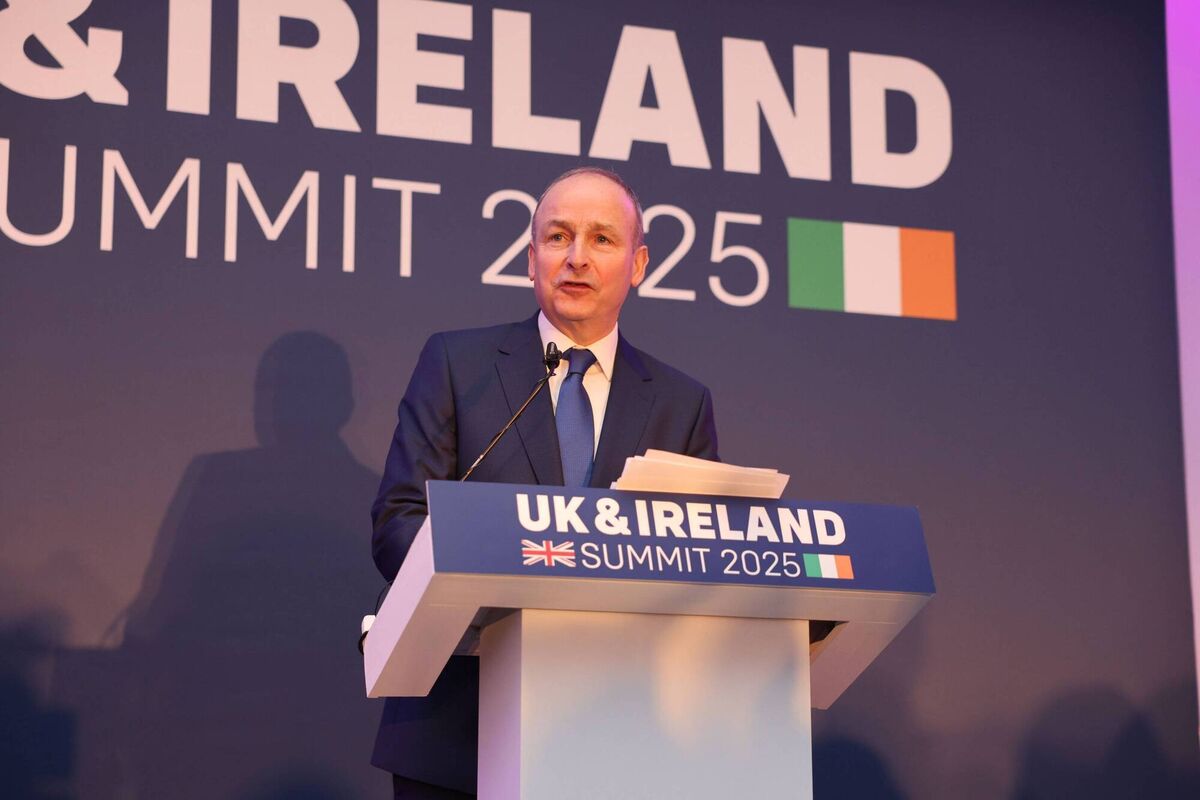
"More than €4.2bn worth of goods and services are traded between the EU and the US daily," he said.
"Disrupting this deeply integrated relationship benefits no one. Tariffs drive inflation, hurt people on both sides of the Atlantic, and put jobs at risk."
As the EU prepares an official response, Tánaiste Simon Harris will attend an EU Trade Ministers in Luxemburg on Monday and will continue to engage with his political counterparts ahead of the gathering.
Mr Harris said there are "no winners" when it comes to tariffs, "they are bad for consumers, put jobs at risk, and drive up costs and uncertainty for business".
He said the Government has been "actively preparing for this possibility" for some time, but said the EU will have to respond in a proportionate manner which "protects our citizens, our workers and our businesses".
Before signing an executive order bringing forth reciprocal tariffs, Mr Trump said he had been "waiting a long time" for "Liberation Day".
Hitting out at "foreign scavengers" who have "ransacked" the US economy, Mr Trump added that "jobs in factories will come roaring back into our country".
However, he blamed former American presidents "who weren't doing their jobs" in protecting industry in the US and "allowed it to be stolen from us".
Chambers Ireland called for a focus on competitiveness and strategic trade engagement to mitigate any adverse economic impact.
“To navigate these challenges effectively we should prioritise strategies that enhance our competitiveness and strengthen our trade engagement, rather than escalating tensions," its CEO Ian Talbot said.
Meanwhile, Social Justice Ireland said there is now an urgent need to develop a broad-based sustainable taxation system pointing out that between €20bn and €30bn in current tax revenue is vulnerable to disappear due to tariffs.
Michelle Murphy, research and policy analyst with Social Justice Ireland warned the potential impact is larger than the 2007 tax revenue collapse and would have very negative consequences.

